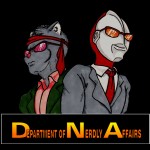
In this episode, Don and Rob look at cultural views of strength in the media. The pair explore why lead characters being strong is so important to North American audiences, how views of strength have changed over time, and what a strong female fighter really means. All this, and how Free to Be You and Me destroyed a generation, is waiting for you in this episode of the Department of Nerdly Affairs.
Closing Music:
Ode to Joy performed by Oliver Eckelt
Things Discussed
Dynaman
1950’s Education Films and PSAs
Bob Dobbs
Self Actulization
Free To Be You and Me
1970’s Exploitation Films
John Carpenter
Slasher Films
Texas Chainsaw Massacre
Mystery Science Theatre Industrial Arts Film
Dirty Harry
Charles Bronson
Dragnet
Adam 12
Kojak
Baretta
Death Wish
Commando
Cobra (Stallone)
The Hills Have Eyes
Silver Bullet
Nightbreed
Spider Baby
Married with Children
Fight Club
1980’s Action Films
The Rock (movie)
Con Air (movie)
Hippy Movement
90s Milk Ads
Conan the Barbarian
Broadchurch
Twin Peaks
Star Trek: Discovery
Surf Nazis Must Die




I forget exactly how you put it… that superheroes are young boys’ wish fulfillment or revenge fantasies or something.
Regardless, I think that’s a cynical and inaccurate assessment. While every story with a hero certainly fulfills a level of wish fulfillment, that’s not the purpose.
Hero stories go back as far as history allows and the truth I think is that they are there for socialization. Fairy-tales are the same reasons for a variety of purposes. Teach children what to avoid, and how to behave.
Hero and later superhero stories provide models of behavior that is beneficial for children to adopt.
– Act honestly and bravely
– Be a part of the solution, not the problem
– Save women, they are more important than you
– Be a leader of men, and expect to sacrifice for your efforts.
– You will become a legend if you do all these things.
>Hero and later superhero stories provide models of behavior that is beneficial for children to adopt.
They can; but there’s a number of motivations for producing entertainment that kinda muddy things. Superheroes have the problem in this respect of passing through different phases, depending on the median age of their perceived audience. During a kids friendly era imparting proper moral values is key; but during an 80’s-esque “NO! They’re NOT just for kids!!!!” turn you get the opposite. I think the diversification of media we currently “enjoy” has split the dif on this one; the comics seek an older audience, the movies a younger one…. the tv shows an even younger one still…. so it’s tougher to peg down EXACTLY what the deal is.
Ultimately modern media is made to sell; and to do that it has to appeal to the audience, and that means telling them what they want to hear just as much as actually imparting a lesson. Kid targeted material usually has a positive moral ‘cos you’re actually selling it to the parents. (Kids have little money.) That’s why stuff aimed at teenagers tends to be a little more over the top and anarchistic…. teens have cash.
>I think that’s a cynical and inaccurate assessment. While every story with a hero certainly fulfills a level of wish fulfillment, that’s not the purpose.
Well…. you’re not WRONG; but there’s a measure of wish fulfilment inherent to ALL superheroes. (Not just the costumed ones either; it applies to the tough guy action cops, kung fu fighters and incorrigible iconoclasts that populate entertainment.) The supers get a bit more usually; the ability to fly, bend the laws of physics, inflict property damage, punch Hitler…. Marvel sought to add something to the mix back in ‘62, and they DID…. but the “heroes with problems” idea struck a chord strongest with the young. The people just starting out in life, struggling with their place. Over the years that concept stuck, and the most popular heroes hit that sweet spot. So that; as well as public perception relegated the stories to “adolescent male power fantasies.” Not entirely fairly; but I think most supers up to the 90’s have at least a hint of that. And many have WAY more than just a hint. To the point that you can see the companies struggling against that concept today. Mostly in the form of ham fisted stories and accusations of “political correcting up” their books, with more than a smidge of critics pointing to the popularity of super characters as an example of the “infantilization of society.”
Don C.